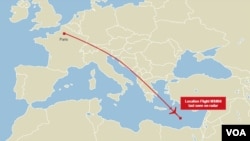A U.S. counterterrorism expert says that commercial aviation around the world is endangered until authorities can pinpoint what caused a Paris-to-Cairo passenger jet to crash into the Mediterranean Sea; a terrorist's bomb is the most likely culprit.
"The important thing to take away from this is that in the event this was a bomb, it's critical that the counterterrorism community find the bomb maker," Fred Burton, vice president of intelligence at the U.S.-based Stratfor global intelligence company, told VOA . "This was a very successful attack and until that bomb maker is located you have a persistent threat against commercial aviation."
He expressed the fear that other bombs might already have been planted on additional aircraft. "There is a sense of urgency to try to determine that," he said.
No rushed conclusions
Even as numerous aviation crash experts voice strong suspicions that terrorism was behind the EgyptAir crash, Anthony Brickhouse, a former U.S. transportation accident investigation official, voiced a note of caution.
"As investigators, we are taught to keep everything on the table until evidence suggests otherwise," he said.
“The wreckage will tell the story and investigators are trained to use the information to piece things together," said Brickhouse. "We know what particular types of damage look like. We know what it looks like after aircraft structural breakup. We know what it looks like after an explosion on board. We know what it looks like when it’s intact and flies into the water. We have historical data to go on.”
Richard Bloom, a key official at Embry-Riddle Aeronautical University, said the accident was likely caused by "some kind of terrorism," but noted that in 1999, an EgyptAir relief co-pilot likely "intentionally crashed" a passenger jet for mental health or religious reasons.
Bloom said that when incidents such as the EgyptAir crash occur, "there will be much talk about what to do to decrease the probability of it happening again in the future. A better way of screening aircrew. A better way of screening passengers. A better way of re-enforcing the plane structure.
"But really we should look into... how we socially and psychologically convey the information so fewer people want to engage in this kind of behavior," he said. "How can you, from a global, national, and local standpoint, talk about the crash and convey it so that people aren’t encouraged to commit more terrorism. That’s far more important than increasing layers of security.”
Known facts so far
Burton said a bomb could have been placed on the EgyptAir flight under a seat or somewhere else on the aircraft, and it could have been designed to explode at a specific time, set off by altitude or barometric pressure or possibly even a suicide bomber posing as a passenger.
He predicted that authorities could reach somewhat "definitive conclusions" about the cause of the crash within three to five days and days later "have an absolute good handle on exactly what transpired."
"They're certainly going to be looking for a claim of responsibility if this was a terrorist attack," Burton said, although no one has yet claimed to have carried out the attack.
Burton, the best-selling author of a book about the 2012 terrorist attack on a U.S. intelligence and military compound in Benghazi, Libya, that killed four Americans, said attacks on commercial aircraft like the EgyptAir plane "are chosen specifically, but they also could be chosen based on the ability to get to that aircraft or the ability to get a bomb onto that aircraft.
"So there's probably a tactical consideration in play here," he said, "as well as a very specific signal that's being sent to France and to Egypt," based on the two countries' military campaigns against Middle East jihadists.
Burton, who for years has investigated air crashes and terrorist attacks, described how the aircraft possibly disintegrated after an explosion at an altitude of 11,582 meters, making a 90-degree turn to the left, then making a full circle and falling toward the Mediterranean, less than an hour before it was scheduled to land in Cairo.
"I put that on the incapacitation of the pilot, meaning you've had a catastrophic event at that altitude, you're going to have a rapid decompression," he said. "In essence, if you envision a plane breaking apart, and then twisting around with the wind shear and the air speed.... That's what's causing that kind of maneuver in my assessment.
"Usually the cockpit is going to fall away by itself in what is called a scatter effect," Burton said. "So in essence the debris starts raining down, plus breaking apart, the swerving motion of the debris falling. That's indicative to me of fairly large pieces of fuselage falling."
He compared the demise of the EgyptAir flight to that of the 1988 explosion of a Pan American passenger jet over Lockerbie, Scotland that killed 270 people in an incident eventually blamed on the Libyan government.
Spiraling out of control
One current A320 captain for a major U.S. airline concurred with Burton's assessment, saying, "The evidence that’s showing so far -- the big turn in the descent -- if the airplane had come apart by some sort of explosion and starts the descent, it’s completely understandable that it was spiraling out of control."
Burton said, "Aircraft have always been the holy grail of terrorists, going back to the 1970s, with the likes of Black September (a Palestinian terrorist organization) and hijackings."
He said aircraft have been known to break apart at high altitude, but that the possibility of that is remote.
"You have to look at the age of the aircraft and maintenance and so forth," he said. "That's one of the things investigators will have to get to the bottom of, but there's usually a root cause for that kind of catastrophic failure.
"Look, planes just don't fall out of the sky," he said. "As you look at all the probability factors, the likelihood of an improvised explosive device would be high."






